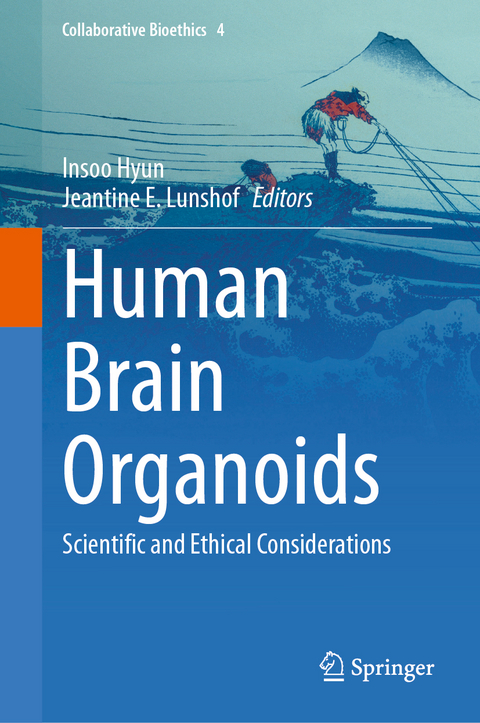
Human Brain Organoids
Springer International Publishing (Verlag)
978-3-031-72370-4 (ISBN)
- Noch nicht erschienen - erscheint am 11.12.2024
- Versandkostenfrei
- Auch auf Rechnung
- Artikel merken
Brain organoids are small stem cell-derived, self-organizing models of specific brain regions that offer researchers new ways to study the human brain. Since their scientific debut over ten years ago, brain organoids have been used to generate tractable new bioengineered tools for understanding functional interconnectivity of the human brain, dysfunction involved in many neurodegenerative diseases, and certain molecular mechanisms underlying cognition.
Despite this field's considerable scientific promise, advances in human brain organoid research also raise novel philosophical questions and ethical concerns around the use of complex human brain models and the ethical boundaries that should exist when manipulating increasingly realistic bioengineered brain constructs. As researchers generate more realistic organoids in vitro that resemble human brains, it is critically important to understand what ethical boundaries may exist and where researchers and regulators should draw the line for research, both to reduce uncertainties over which projects to pursue in the lab and to address future concerns regulators and the public may harbor about whether this research, if left unexamined, could inadvertently undermine public trust in science. This proposed book delves into ongoing and proactive ethical discussions among ethicists and the neuroscientists involved with this cutting-edge work. Its ultimate goal is to foster greater awareness, understanding, and guidance for future management of ethical issues that may be unique to new areas of brain organoid research. This volume is the result of a close partnership between ethicists and scientists, each informing the other through a collaborative process of joint bioethical deliberation.
Insoo Hyun, Ph.D., received his BA and MA in Philosophy with Honors in Ethics in Society from Stanford University and his PhD in Philosophy from Brown University. He is the Director of the Center for Life Sciences and Public Learning at the Museum of Science, Boston and an Affiliate of the Center for Bioethics at Harvard Medical School. Previously, Dr. Hyun was Professor of Bioethics and Philosophy at Case Western Reserve University School of Medicine, where he has taught undergraduate, graduate, and medical students for over 18 years. Since 2005, Dr. Hyun has been heavily involved with the International Society for Stem Cell Research (ISSCR). He has helped draft all of the ISSCR's international research guidelines, including the guidelines for brain organoid research, and has twice served as the Chair of the ISSCR Ethics Committee. His intellectual interests include stem cell ethics and policy, emerging technologies in the life sciences, and new strategies for community engagement in bioengineering. From 2018 to 2021, he co-led with Jeantine E. Lunshof an NIH BRAIN Initiative-funded project exploring the ethics of human brain organoid research, in collaboration with three leading laboratories at Harvard University, Harvard Medical School, and Stanford University. His book Bioethics and the Future of Stem Cell Research was published by Cambridge University Press in 2013.
Jeantine E. Lunshof, Ph.D., received her BA in Philosophy and Tibetan Language and Culture from the University of Hamburg, her MA in Philosophy and Health Law from the University of Amsterdam, and her PhD from VU University Amsterdam. Following her BA, she obtained an RN and worked over 10 years in clinical oncology. She is currently Collaborative Ethics Lead at the Wyss Institute for Biologically Inspired Engineering at Harvard University. As a collaborator of George Church in the Department of Genetics at Harvard Medical School she developed the model of 'Collaborative Ethics' that she is currently implementing across the field of biologically inspired engineering at the Wyss Institute. Recent work has been on stem cell-derived nervous system organoids, embryo-like entities, and AI-designed biological systems.
Introduction.- Current Trends in Brain Organoid Research: Scientific Opportunities and Challenges.- No Need to Worry About Consciousness in Brain Organoids.- Brain-likeness? Empty or Full Makes the Difference.- The Brainstorm Organoid Project: A Collaboration of Bioethics and Neuroscience to Advance Brain Organoid Research.- Collaborative Bioethics in Action: A Guide for Successful Collaborative Workshops.- What Would It Take to Put a Philosopher in Every Scientific Laboratory?.- A Proposed Review Guide for the Oversight of Brain Organoid Research.- The Ethics of Transplanting Brain Organoids into Neonatal Animals.- Ambassador-Mediated Public Engagement: A Responsible and Realistic Scientific Public Engagement Framework.- Brain Organoids and the Law.- Organoid Computing: Leveraging Organoid Neural Networks for Artificial Intelligence.
| Erscheinungsdatum | 21.11.2024 |
|---|---|
| Reihe/Serie | Collaborative Bioethics |
| Zusatzinfo | XIII, 182 p. 8 illus., 5 illus. in color. |
| Verlagsort | Cham |
| Sprache | englisch |
| Maße | 155 x 235 mm |
| Themenwelt | Medizin / Pharmazie ► Medizinische Fachgebiete ► Biomedizin |
| Naturwissenschaften ► Biologie ► Genetik / Molekularbiologie | |
| Schlagworte | Bioengineering • Bioethics • Developmental Biology • Interdisciplinarity • Neuroethics • Philosophy • Stem Cells |
| ISBN-10 | 3-031-72370-8 / 3031723708 |
| ISBN-13 | 978-3-031-72370-4 / 9783031723704 |
| Zustand | Neuware |
| Haben Sie eine Frage zum Produkt? |
aus dem Bereich


